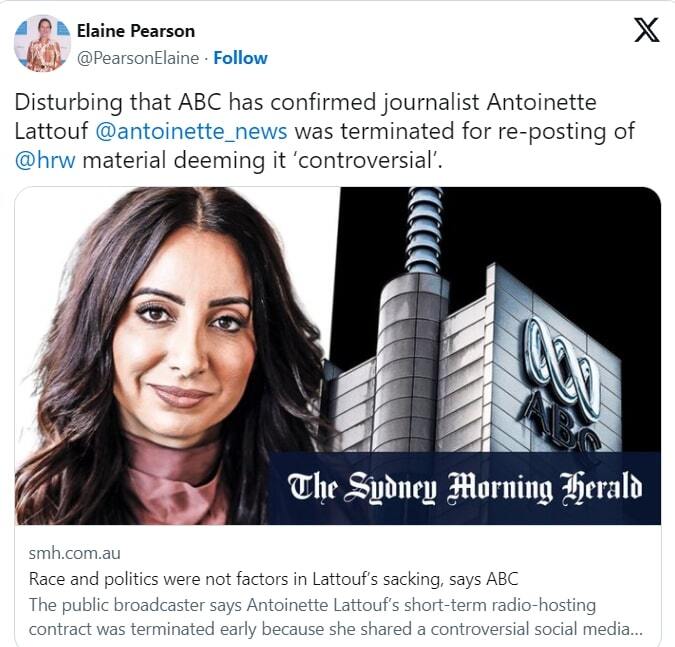Fired Journalist's Revelation Sparks Controversy: Are Pro-Palestine Voices Being Muzzled in the West?
Australian journalist Antoinette Lattouf has launched a legal case, labeling her termination as "not a victory for journalism or critical, fair thinking"

In the aftermath of a seasoned journalist getting abruptly fired for an apparent pro-Palestine stance, the company in question Australian Broadcasting Corporation (ABC) is refuting accusations that the action was allegedly taken due to the ‘pressure’ of pro-Israel advocates.
Antoinette Lattouf, a Lebanese-Australian journalist employed on a short-term contract with an ABC morning radio program, found herself terminated soon after sharing a post from Human Rights Watch on Instagram. The post implicated the Israeli government in "using starvation of civilians as a weapon of war in Gaza."

Inscrutably, the broadcaster had covered the accusation in a report itself. However, a series of WhatsApp messages obtained by the Sydney Morning Herald revealed that a group called Lawyers for Israel exerted pressure on ABC's top leadership to take her off the air. A member of Lawyers for Israel went so far as to label Lattouf's lawyer, who is Jewish, as a traitor.

Lattouf, in response to her termination, has initiated a legal challenge, deeming it "not a win for journalism or critical, fair thinking.” Josh Bornstein, one of the lawyers representing her, claimed the sacking was “based on both political opinion and race”. The case is due to be heard by Australia’s Fair Work Commission.
The broadcaster is claiming that the journalist was terminated "because she ignored a direction from managers and shared a controversial social media post from Human Rights Watch."
Staff at the ABC headquarters in Sydney are defiantly said to have issued a threat to walk out unless management addresses concerns raised by a Sydney Morning Herald report. There have been reports of the ABC's Melbourne office facing an act of vandalism in the wee hours of Friday morning. Red paint adorned the windows and doors of the Southbank office, conveying the message, "Tell the truth about Palestine."

Managing Director David Anderson released a statement, “ The ABC rejects any claim that it has been influenced by any external pressure, whether it be an advocacy or lobby group, a political party, or commercial entity.”
He added, “Staff routinely perform their roles for the Australian public without fear or favor, adhering to our responsibilities of impartiality and accuracy – often in the face of significant unwarranted criticism."
The swift decision to end Lattouf's contract sparked discussions about the challenges journalists face in navigating sensitive geopolitical issues and the potential impact on their professional roles.

Elaine Pearson, Director of the Asia division at Human Rights Watch, expressed concern over removing Lattouf, calling it "disturbing." Pearson emphasized that journalists ought to be encouraged to enhance human rights reporting, rather than facing penalties for their efforts.
There's growing concern about pro-Israel influencers suppressing dissent. Journalists in the United States, the United Kingdom, and Canada have faced job losses or suspensions following the October 7 attack by Hamas, which ignited the Israeli offensive.
From Employment to Exclusion: The Harsh Reality for Pro-Palestine Advocates
Right-wing pro-Israeli groups such as the Committee for Accuracy in Middle East Reporting in America (CAMERA) has been accused for years of trying to suppress academics, activists, entertainers, and journalists advocating Palestinian perspectives.
Since the onset of the Israeli conflict in Gaza, several media professionals have been either terminated or suspended in situations similar to that of Lattouf’s.

In December, MSNBC canceled broadcaster Mehdi Hasan's popular show and was promptly accused of bias because of his vocal criticism of Israel's military actions, condemnation of "apartheid" policies against Palestinians, and his opposition to U.S. Middle East wars.
 It's been claimed that Zahraa Al-Akhrass was dismissed from her position at Canada's Global News as a result of her social media posts highlighting the plight of Palestinians.
It's been claimed that Zahraa Al-Akhrass was dismissed from her position at Canada's Global News as a result of her social media posts highlighting the plight of Palestinians.
Cassie Derrick, media director for the advocacy group Media, Entertainment & Arts Alliance, said that journalists were “demanding their bosses have their backs and stand up for a free, independent press."
A spokesperson for Palestine Legal, a civil rights group, reported addressing over 260 "incidents of suppression" against Palestinian rights activists in the first two weeks of October alone—surpassing the total for the entire preceding year.

Pulitzer Prize-nominated opinion journalist Abdallah Fayyad suggests that the majority of editors lack expertise in foreign policy or the Middle East. Consequently, their coverage often aligns with the perspectives of the pro-Israel U.S. State Department and White House on various issues.
